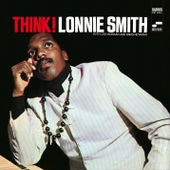Lonnie Smith - Think! (1968)
 The leader of Think! is one of two keyboard-playing Lonnie Smiths who emereged in the 1960s and have caused more than a bit of discographic confusion. The other, slightly older Lonnie Smith (Lonnie "Piano" Smith, if you will) recorded under that name with Roland Kirk and a few others. By the time he joined Pharaoh Sanders in 1969, he began using his middle name as well and was henceforth known as Lonnie Liston Smith.
The leader of Think! is one of two keyboard-playing Lonnie Smiths who emereged in the 1960s and have caused more than a bit of discographic confusion. The other, slightly older Lonnie Smith (Lonnie "Piano" Smith, if you will) recorded under that name with Roland Kirk and a few others. By the time he joined Pharaoh Sanders in 1969, he began using his middle name as well and was henceforth known as Lonnie Liston Smith.The present Lonnie Smith (or Dr. Lonnie Smith, as he has taken to call himself in recent years) was born in 1942 in Buffalo and began his musical career while still a teenager in a doo-wop group that also included Grover Washington Jr. Fascination with Jimmy Smith's 1960 Blue Note album Midnight Special led Smith to the organ, an instrument he mastered without formal instruction. While sitting in with Jack McDuff's band in 1964, he met and immediately bonded with McDuff's guitarist George Benson. The encounter led to the formation of Benson's own quartet in 1966 (a band that would soon also feature drummer Marion Booker Jr.) and to Smith's recording debut with Benson and Columbia.
Benson's band made enough of a splash to earn Smith his own Columbia album, Finger Lickin' Good, but what really cemented the reputations of the guitarist and organist was their contribution to Lou Donaldson's 1967 Blue Note hit Alligator Boogaloo. Smith participated in two more sessions with Donaldson over the next year, and then landed his own contract with the label, with Think!, the first of five albums Smith recorded as a leader over the next two years.
The personnel involved here, and the variety of material featured, make this far superior to the organ-combo norm of the late 1960s. In addition to the soulful, still-underrated Melvin Sparks and the always reliable David Newman , the band includes trumpeter Lee Morgan, who had participated in some of the greatest organ jam sessions in history with Jimmy Smith a decade earlier. While taking his music into more contemporary post-bop areas at the end of his career, Morgan also began making occasional appearances with organists again. He returned for Lonnie Smith's next album, Turning Point and did guest turns with Blue Note artists Larry Young and Rueben Wilson, all in 1969. Two days before his murder in 1972, Morgan made his last studio appearance with another organist, Charles Earland on Prestige. As was the case on those other dates, Morgan never had to simplify his approach to accomodate the format (hear his turnarounds on "Slouchin") and the soulful content of his contributions were a given. He also blends well with Newman, who was Morgan's frontline partner on the trumpeter's 1967 Sonic Boom.
On "The Call of the Wild" and "Slouchin", a three-piece Afro-Latin percussion section under the leadership of Henry Brown is added. They lend a particularly orgiastic rhythm vibe to the former track. Norberto Apellaniz, credited as a second conga player here, was regularly heard on bongos in Brown's popular combo of the time, the Latin Soul Brothers.
The material is fairly straight-forward, with a minimum of harmonic movement, yet there is a variety in the arrangements and consistent quality in the solo contributions. Among the three covers is "Three Blind Mice" that borrows directly, albeit at a slower tempo, from the arrangement of the nursery rhyme that Curtis Feller crafted for Art Blakey and the Jazz Messengers in 1962.
Smith's subsequent history is indicative of the struggles that all organists encountered. The rise of electric pianos and other keyboards in 1970 signaled what appeared to be the death knell of the Hammond B-3. Public interest dropped so precipitously that Smith's final Blue Note date, the presence of Benson notwithstanding, remained unissued for a quarter century. Odd Smith albums appeared on a variety of labels throughout the next two decades, until a few trio albums for the Japanese Venus imprint in the early 1990s reminded the world that the now-turbaned Dr. Smith remained at the peak of his powers. As these notes are written, Smith has just released a new collection under his own name on Palmetto. He continues his work regularly with Lou Donaldson, and has become the organist of choice for musicians of diverse styles and generations.
No comments:
Post a Comment